News
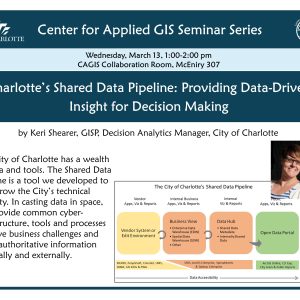
Keri Shearer talks about GIS and Charlotte’s Shared Data Pipeline
Please join us tomorrow to hear Keri Shearer from the City of Charlotte talk about the City’s Shared Data Pipeline. The City of Charlotte has a wealth of data and tools. The Shared Data Pipeline is a tool we developed to help grow the City’s technical capacity. In casting data in space, we provide common […]
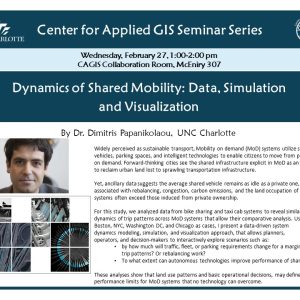
Are Mobility on Demand (MoD) systems more sustainable?
Please join us on February 27th to hear Dr. Dimitris Papanikolaou present his comparative analyses of MoDs and traditional ride hailing services.
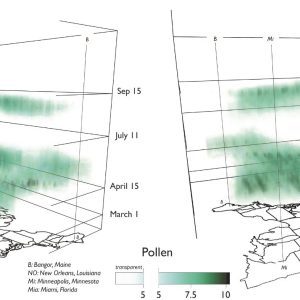
The Where and When of Hay Fever
Charlotte, December 2018. Allergic rhinitis (or hay fever) effects roughly 15 out of 100 Americans, but sufferers have had little guidance on how to avoid the pollen outbreaks that aggrevate thier symptoms. Blooms of trees, grasses and herbaceous plants are to blame, but seasonality and variations in climate have made it hard to understand where […]
Call for Book Chapter: High-performance Computing for Geospatial Applications
An edited book entitled “High Performance Computing for Geospatial Applications” has been approved by Springer. Editors are Drs. Wenwu Tang (University of North Carolina at Charlotte) and Shaowen Wang (University of Illinois at Urbana-Champaign). Here is the background information of the book. High Performance Computing (HPC) allows for the use of advanced computer systems to […]
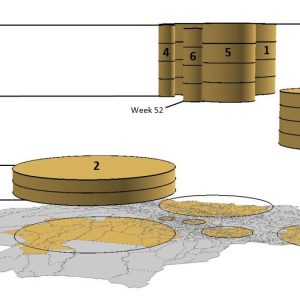
CAGIS researcher uses space-time visualizations to target outbreaks of mosquito-borne illnesses in Colombia
Charlotte, October 2018. In a new paper, CAGIS researcher and lead author Michael Desjardins describes new methods to visualize the complex, spatio-temporal dynamics of outbreaks in mosquito-born illnesses in Colombia. Outbreaks of chikungunya and dengue fever (both transmitted by the same two mosquitoes) occur unevenly across municipalities both geographically and in timing, presenting substaintial challenges […]
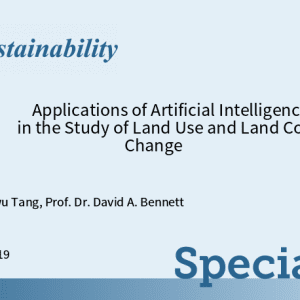
Call for Paper: Sustainability Special Issue: Applications of Artificial Intelligence in the Study of Land Use and Land Cover Change
Artificial intelligence has been increasingly used to support the study of coupled land systems, which are complex adaptive spatial systems driven by land use and land cover change. These artificial intelligence approaches comprise: 1) Machine learning (e.g., artificial neural networks, decision trees), 2) Evolutionary computation (e.g., genetic algorithms, evolutionary algorithms), 3) Distributed artificial intelligence (e.g., […]
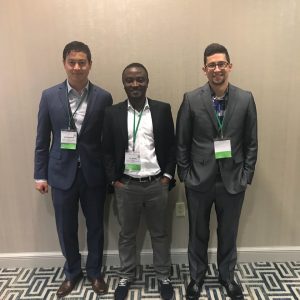
CAGIS goes to AAG
CAGIS made its presence felt at the Annual Association of American Geographer’s Conference in New Orleans, April 10-14. CAGIS students, faculty and associates made eight representations on a range of subjects: Zheng, M., Tang, W., 2018. Multilevel analysis of spatially explicit model. Annual Meeting of the Association of American Geographers, New Orleans, LA, USA. April […]

New Funding
We are pleased to announce that CAGIS just received another award from Charlotte Research Institute Targeted Research Internal Seed Program (CRI TRISP). PIs for this internal grant Development of an Integrated GIS-based Pavement Management System are Drs. Don Chen (Engineering Technology), Wenwu Tang (CAGIS), and Umit Cali (Engineering Technology). CAGIS will be in charge of […]
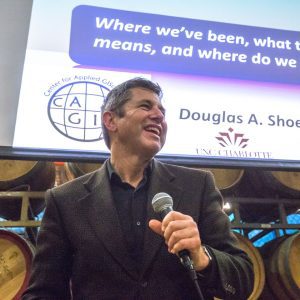
CAGIS Director talks urban growth for Sustain Charlotte’s “Grow Smart CLT” Series
The Center for Applied GIScience’s (CAGIS) Director of Research and Outreach, Dr. Douglas Shoemaker, talked urban growth to an ethusiastic gathering of Charlotteans as part of “Sustain Charlotte’s Grow Smart CLT” series. Held at Resident Culture Brewing Company in the Plaza-Midwood neighborhood, Shoemaker described the results of three studies: 1) an historical analyses of satellite […]
Tang leads group awarded funding to apply AI to remote hydraulic structure classification
Center for Applied GIScience (CAGIS) Executive Director Dr. Wenwu Tang recently won, along with colleagues Drs. Shen-en Chen, John Diemer and Craig Allan, funding from NC Department of Transportation to study the application of artifical intelligence to the problem of classifying hydralic structures remotely. Researchers will develop a spatially explicit 3D modeling framework and a […]